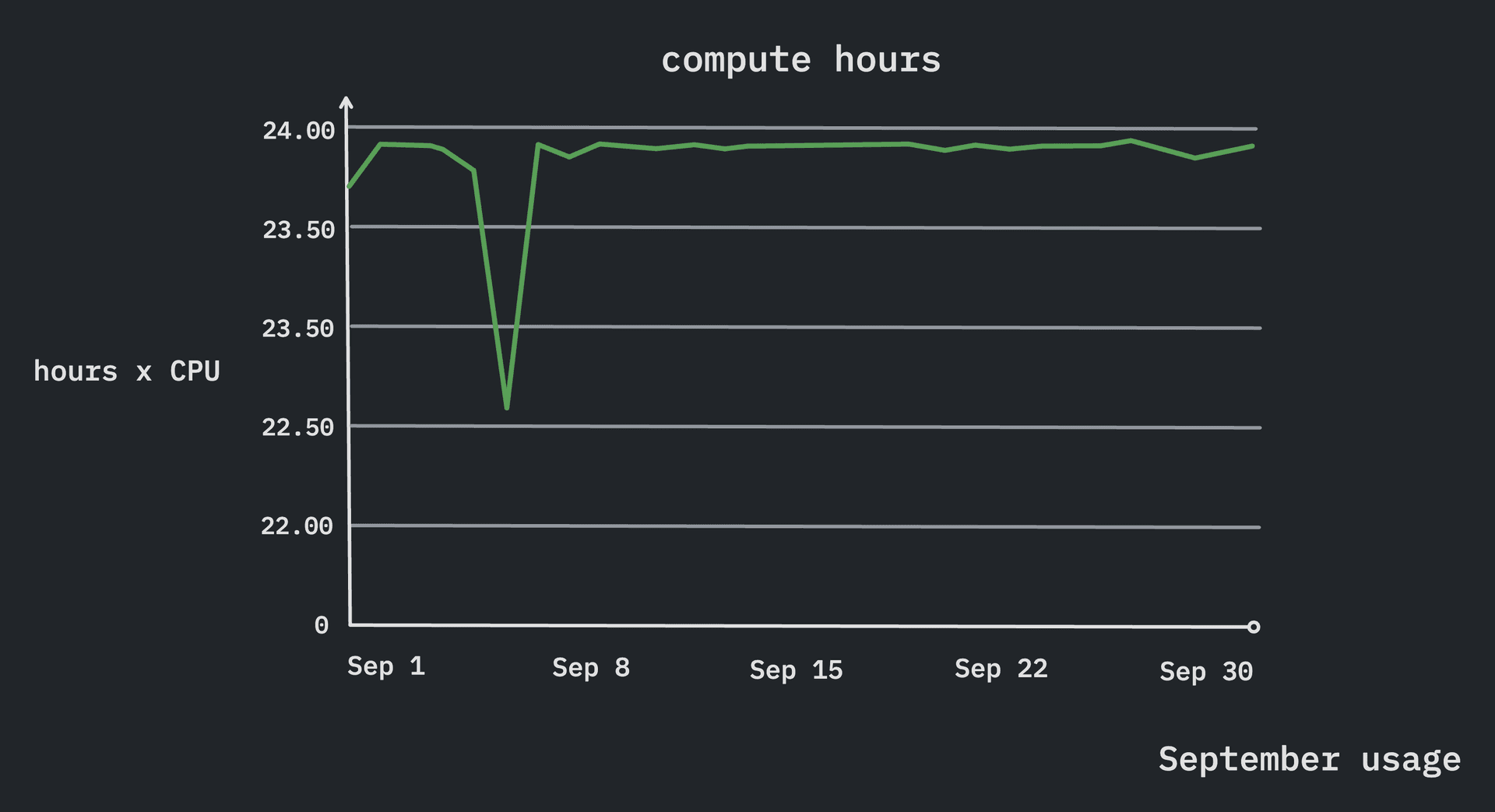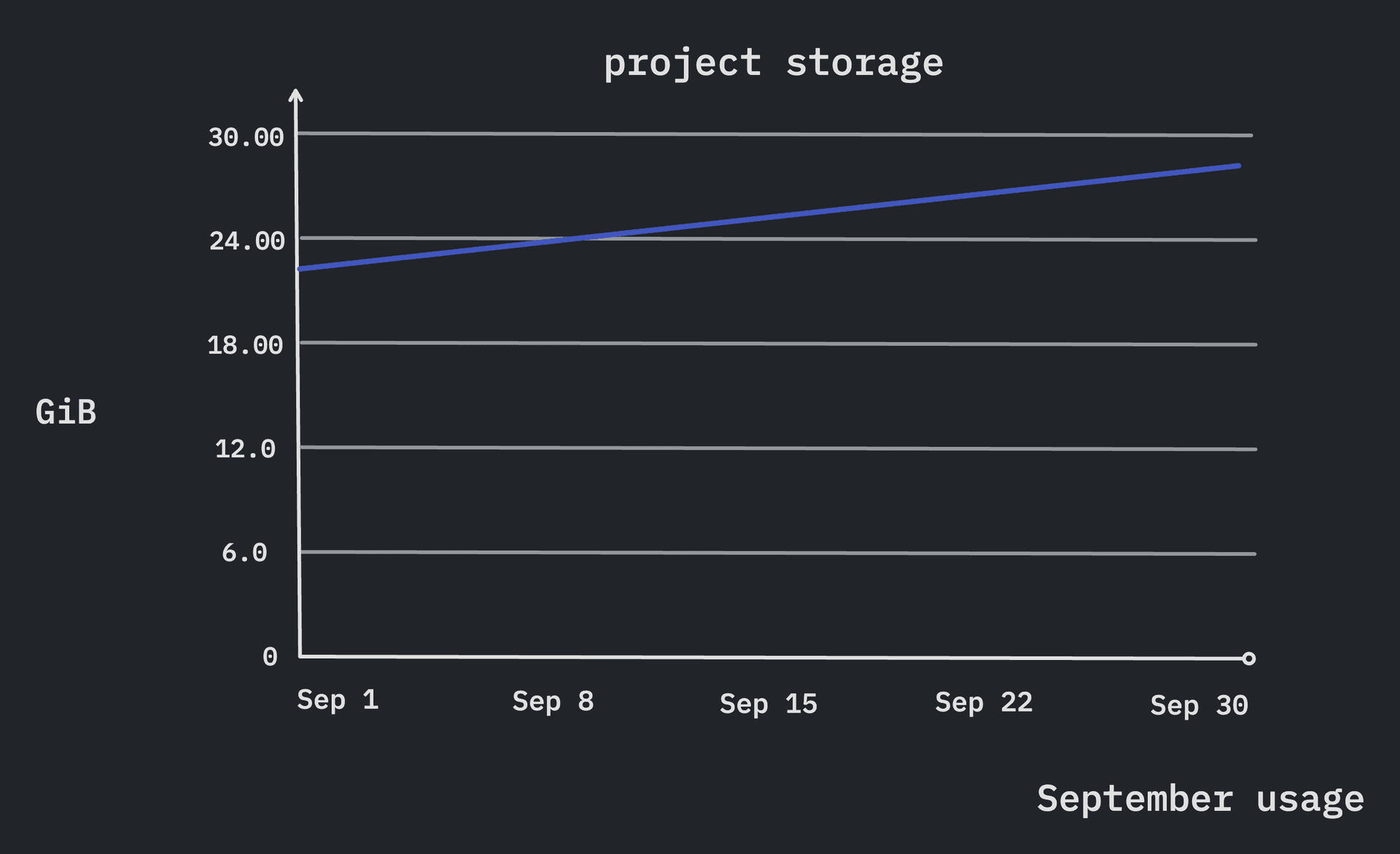Sample project billing
Practical example of how Neon pricing is calculated
Generative AI example
To give you a clearer sense of how billing works, let's explore a real-world example. Consider a simple image generation app that leverages Neon as the serverless database for storing user authentication details as well as records of image generation per user. Analyzing this usage over a monthly billing period can help you understand the nuances of Neon billing based on actual scenarios and choose the right pricing plan.
Overview: Costs by usage
Roughly six months since launch, this high-traffic application attracts about 80K visitors daily, up to 450K weekly. It receives a steady influx of new users, with 3-5 new accounts created every hour. Each user's activity is capped at 5 images per month. This pattern of interaction and account creation gives you a sense of the steady volume of activity hitting the database.
Assumptions
Tech stack (user management portion of the app):
- Authentication: NextAuth.JS for authentication with OAuth
- Database: Neon Serverless Postgres to store user info and session detail
- ORM: Prisma ORM for database interactions
- Deployment Region: US East (Ohio)
Userbase:
- Daily Active Users. 80,000 users/day, implying a consistent volume of read queries. With a global, consumer-oriented user base, traffic is evenly distributed with no distinct peaks or dormant periods.
- Account creation. Average of 3-5 sign-ups per hour, totaling 120 new accounts per day. This gives you an idea of the number of write operations to the database for user authentication.
- User activity. Each user's usage is capped at 5 generations per month. This includes logging IDs of generated photos and the incremental number of generations, which are written to the relevant tables.
note
Given the high number of connections used by this application, connection pooling is essential.
Compute hours and storage:
- Compute hours. This is the metric Neon uses to track compute usage. 1 compute hour is equal to 1 active hour for a compute with 1 vCPU. If you have a compute with .25 vCPU, as you do in this sample scenario, it takes 4 active hours to use 1 compute hour. You can use this formula to calculate compute hour usage:
compute hours = compute size * active hours. The average daily number of active hours is 23.94, totaling 718.35 active hours for the sample month. This indicates steady but low-intensity database usage. - Storage. The amount of database storage currently used by your project. It includes the total volume of data across all branches plus a history of database changes. The amount of history retained is defined by your chosen history retention period. The storage size in this sample scenario is now over 25 GiB and growing steadily with new written data as the user base grows.
Usage breakdown for the month
These graphs show the compute and storage usage for the month.
Compute
Compute usage is steady at almost 24 active hours per day across the month.

A daily average of 23.94 active hours amounts to 713.35 active hours for the month.
Storage
Project storage grew 4.4 GiB over the month, from 23.6 GiB to 28 GiB.

Table view
Here are the monthly totals for compute and storage usage.
| Metric | Daily Average | Monthly Total |
|---|---|---|
| Compute | 23.94 active hours | 718.35 active hours |
| Metric | Start of the month | End of the month |
|---|---|---|
| Storage | 23.6 GiB | 28 GiB |
Which Neon pricing plan fits best?
At roughly 718 active hours for the month with a compute size of 0.25 vCPU, this application is well under the 300 compute hours (1,200 active hours)/month allowance for the Launch plan and 750 compute hours (3000 active hours)/month for the Scale plan. However, with a storage size of 25 GiB, the storage requirements for the application are over the Launch plan allowance of 10 GiB. You could go with the Launch plan which offers 10 GiB of storage plus extra storage at $3.50 per 2 GiB unit or the Scale plan which offers 50 GiB storage. Let's do that math to compare monthly bills:
Launch plan:
- Base fee: $19
- Storage usage: 25 GiB (15 GiB over the allowance)
- Compute usage: 718 active hours (within the 300 compute hour/1200 active hour allowance)
- Extra storage fee: 8 * $3.50 = $28
- Extra compute fee: $0
Total estimate: $19 + $28 = $47 per month
Scale plan:
- Base fee: $69
- Storage usage: 25 GiB (within the 50 GiB allowance)
- Compute usage: 718 active hours (within the 750 compute hour/3000 active hour allowance)
- Extra storage fee: $0
- Extra compute fee: $0
Total estimate: $69 per month
The Launch plan is more economical in the short term, but you might consider upgrading to the Scale plan when purchasing extra storage on the Launch plan is no longer cheaper than moving up to the $69 per month Scale plan. The Scale plan has a higher monthly storage allowance (50 GiB) and a cheaper per-unit extra storage cost (10 GiB at $15 vs. 2 GiB at $3.5). The Scale plan also offers additional features and more projects, which may factor into your decision about when to upgrade.
Last updated on